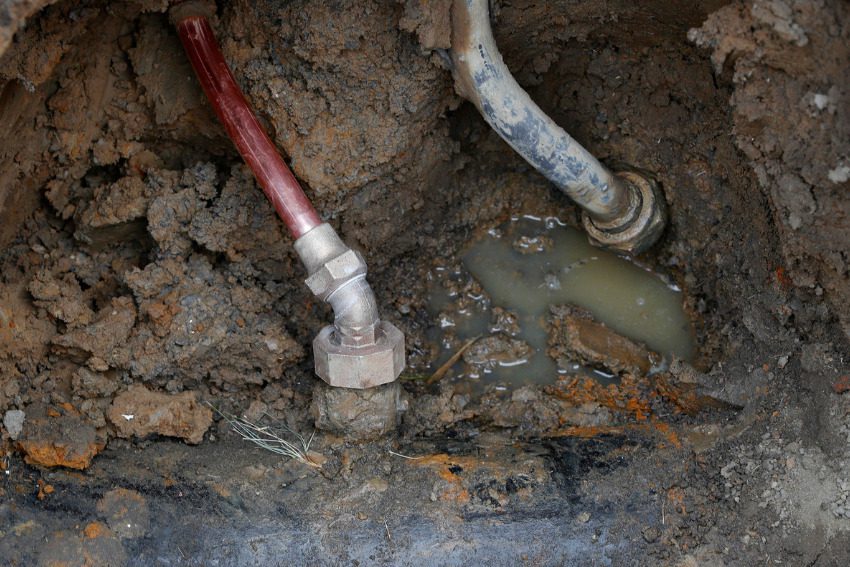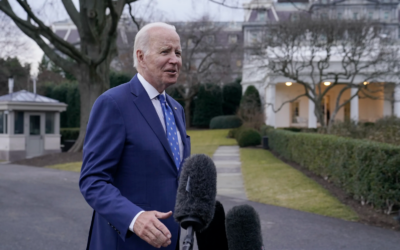
(AP Photo/Paul Sancya, File)
A decade after the Flint, Michigan, water crisis raised alarms about the continuing dangers of lead in tap water, President Joe Biden is setting a 10-year deadline for cities across the nation to replace their lead pipes, finalizing an aggressive approach aimed at ensuring that drinking water is safe for all Americans.
Biden is expected to announce the final Environmental Protection Agency rule Tuesday in the swing state of Wisconsin during the final month of a tight presidential campaign. The announcement highlights an issue—safe drinking water—that Kamala Harris has prioritized as vice president and during her presidential campaign. The new rule supplants a looser standard set by former President Donald Trump’s administration that did not include a universal requirement to replace lead pipes.
Biden and Harris believe it’s “a moral imperative” to ensure that everyone has access to clean drinking water, EPA Administrator Michael Regan told reporters Monday. “We know that over 9 million legacy lead pipes continue to deliver water to homes across our country. But the science has been clear for decades: There is no safe level of lead in our drinking water.”
The rule is the strongest overhaul of lead-in-water standards in roughly three decades. Lead, a heavy metal used in pipes, paints, ammunition and many other products, is a neurotoxin that can cause a range of disorders from behavioral problems to brain damage. Lead lowers IQ scores in children, stunts their development and increases blood pressure in adults.
The EPA estimates the stricter standard will prevent up to 900,000 infants from having low birthweight and avoid up to 1,500 premature deaths a year from heart disease.
The new regulation is stricter than one proposed last fall and requires water systems to ensure that lead concentrations do not exceed an “action level” of 10 parts per billion, down from 15 parts per billion under the current standard. If high lead levels are found, water systems must inform the public about ways to protect their health, including the use of water filters, and take action to reduce lead exposure while concurrently working to replace all lead pipes.
Lead pipes often impact low-income urban areas the most. They are most commonly found in older, industrial parts of the country, including major cities such as Chicago, Cleveland, New York, Detroit and Milwaukee, where Biden and Regan will announce the standards on Tuesday.
The new rule also revises the way lead amounts are measured, which could significantly expand the number of cities and water systems that are found to have excessive levels of lead, the EPA said.
To help communities comply, the agency is making available an additional $2.6 billion for drinking water infrastructure through the bipartisan infrastructure law. The agency also is awarding $35 million in competitive grants for programs to reduce lead in drinking water.
The 10-year timeframe won’t start for three years, giving water utilities time to prepare. A limited number of cities with large volumes of lead pipes may be given a longer timeframe to meet the new standard.
Biden will make the announcement in Milwaukee, a city with the fifth-highest number of lead pipes in the nation, according to the EPA. Officials there are using money from the federal infrastructure law to accelerate lead-pipe replacement work and meet a goal to remove all lead pipes within 10 years, down from an initial 60-year timeframe.
Lead pipes can corrode and contaminate drinking water; removing them sharply reduces the chance of a crisis. In Flint, a change in the source of the city’s drinking water source more than a decade ago made it more corrosive, spiking lead levels in tap water. Flint was the highest-profile example among numerous cities that have struggled with stubbornly high levels of lead, including Newark, New Jersey, Benton Harbor, Michigan, and Washington, D.C.
The original lead and copper rule for drinking water was enacted by the EPA more than 30 years ago. The rules have significantly reduced lead in tap water but have included loopholes that allowed cities to take little action when lead levels rose too high.
“EPA’s action today is a leap forward in protecting the health of tens of millions of Americans from this scourge,” said Erik Olson, a health and food expert at the nonprofit Natural Resources Defense Council.
Actually getting the lead pipes out of the ground will be an enormous challenge. The infrastructure law approved in 2021 provided $15 billion to help cities replace their lead pipes, but the total cost will be several times higher. The requirement also comes as the Biden administration proposes strict new drinking water standards for forever chemicals called PFAS, or per- and polyfluoroalkyl substances. These standards will also improve public health although at a cost of billions of dollars.
The American Water Works Association, an industry group, said when the proposed rule was announced that it supports EPA’s goals, but warned that costs could be prohibitive.
Fifteen Republican attorneys general, led by Kris Kobach of Kansas, have criticized the EPA rule as “unworkable, underfunded and unnecessary.” The GOP officials said they are concerned that homeowners in some places might have to pay to replace pipe sections under their property—a requirement Kobach said Congress did not authorize. The EPA says federal grants worth billions of dollars will help communities replace their pipes.
Regan said the benefits of the rule far outweigh the costs. “We believe we’ve done it in a very strategic way—a legally sound way—supported by the science and the health benefits of this rule are undeniable,” he said.
Another hurdle is finding the lead pipes. Initial pipe inventories are due this month, and many cities have said they don’t know what substances their pipes are made of. Without knowing their location, it is hard to efficiently replace them, according to Eric Schwartz, co-founder of BlueConduit, a company formed in response to the Flint crisis that helps cities find their lead pipes.

Biden campaign co-chair Mitch Landrieu NH visit highlights Biden’s infrastructure successes versus Trump’s broken promises
Former New Orleans Mayor and Biden-Harris national campaign co-chair Mitch Landrieu will visit New Hampshire this Wednesday to spotlight the...

Shaheen secures provisions to hire more air traffic controllers as part of FAA reauthorization bill
US Senator Jeanne Shaheen has lauded the passage of the Federal Aviation Administration (FAA) Reauthorization legislation, a move that promises to...

New Hampshire delegation introduces bill to block closure of NH’s only mail center
In a direct response to the United States Postal Service's (USPS) recent decision to reroute operations from New Hampshire's sole mail processing...

This federal program is saving Granite Staters money on their internet–here’s how to sign up
In the modern world, access to the internet is not only necessary, but crucial for Americans to be able to do their jobs, go to school, access...

Rep. Kuster’s bill to boost broadband in rural NH heads to Biden’s desk
The House of Representatives this week passed the 5G Spectrum Authority Licensing Enforcement (SALE) Act, a bill cosponsored by Congresswoman Annie...

Biden wants to replace all lead pipes in New Hampshire within 10 years
The Biden administration proposed a new rule last week that would require water utilities in New Hampshire and across the country to replace all of...



